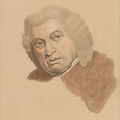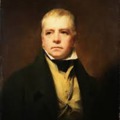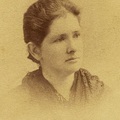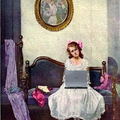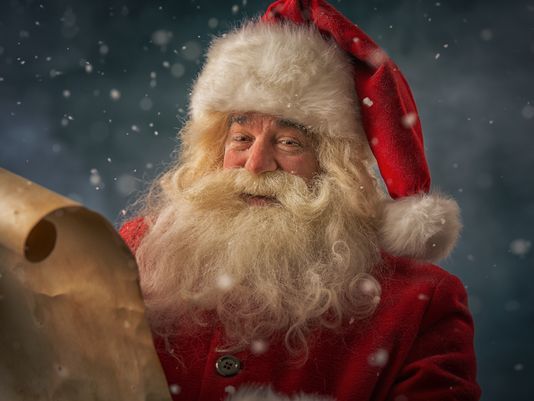
A főleg angolszász kultúrájú országokban a karácsonyi időszak szorosan összekapcsolódik Santa Claus-szal. A rózsás arcú, nagy szakállú, kissé molett, csokoládét osztogató Mikulás figurája egy New York-i hely lapban, a Sentinelben név nélkül közölt versben jelenik meg, 1823-ban A Visit from Saint Nicholas címmel. Ez a kis vers változtatja meg Santa Claus figuráját, aki addig hagyományosan aszkétikus alkat volt, lóháton közlekedett, keveréke volt a Brit Father Christmas, a Dán Sinterklaas és a negyedik században élt Szent Miklósnak, a Lycia római provinciában fekvő Myra püspökének.
Az 1823. december 23.-án megjelent versben Santa nyolc rénszarvassal közlekedik (mind a nyolcnak neve is van), kéményen keresztül viszi az ajándékokat a gyerekeknek, válik azzá a jovioális figurává, amilyennek ma ismerjük.
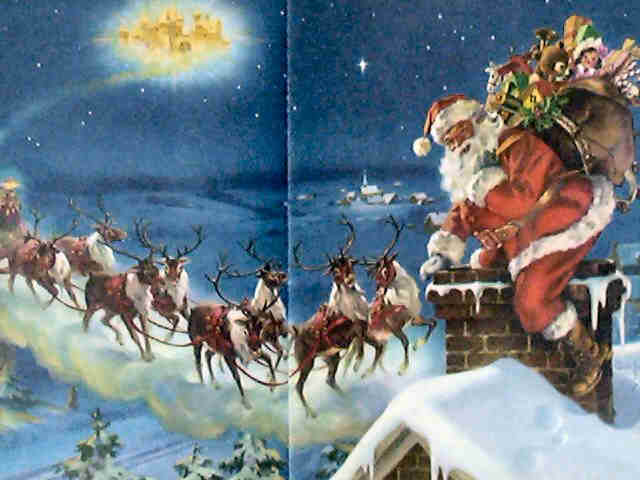
Ez a kis vers változtatja meg Santa Claus figuráját, aki addig hagyományosan aszkétikus alkat volt, lóháton közlekedett, keveréke volt a Brit Father Christmas, a Dán Sinterklaas és a negyedik században élt Szent Miklósnak, a Lycia római provinciában fekvő Myra püspökének.
Az 1823. december 23.-án megjelent versben Santa nyolc rénszarvassal közlekedik (mind a nyolcnak neve is van), kéményen keresztül viszi be a lakásokba az ajándékokat, válik azzá a jovioális figurává, amilyennek ma ismerjük.
A Visit from St. Nicholas
Twas the night before Christmas, when all thro' the house
Not a creature was stirring, not even a mouse;
The stockings were hung by the chimney with care,
In hopes that St. Nicholas soon would be there;
The children were nestled all snug in their beds,
While visions of sugar plums danced in their heads
And Mama in her 'kerchief, and I in my cap,
Had just settled our brains for a long winter's nap[1]—
When out on the lawn there arose such a clatter,
I sprang from the bed to see what was the matter.
Away to the window I flew like a flash,
Tore open the shutters, and threw up the sash.
The moon on the breast of the new fallen snow,
Gave the luster of mid-day to objects below;
When, what to my wondering eyes should appear,
But a miniature sleigh, and eight tiny reindeer,
With a little old driver, so lively and quick,
I knew in a moment it must be St. Nick.
More rapid than eagles his coursers they came,
And he whistled, and shouted, and call'd them by name:
"Now! Dasher, now! Dancer, now! Prancer and Vixen,
"On! Comet, on! Cupid, on! Dunder and Blixem;
"To the top of the porch! To the top of the wall!
"Now dash away! Dash away! Dash away all!"
As dry leaves that before the wild hurricane fly,
When they meet with an obstacle, mount to the sky;
So up to the house-top the coursers they flew,
With the sleigh full of toys—and St. Nicholas too:
And then in a twinkling, I heard on the roof
The prancing and pawing of each little hoof.
As I drew in my head, and was turning around,
Down the chimney St. Nicholas came with a bound:
He was dress'd all in fur, from his head to his foot,
And his clothes were all tarnish'd with ashes and soot;
A bundle of toys was flung on his back,
And he look'd like a peddler just opening his pack:
His eyes—how they twinkled! His dimples: how merry,
His cheeks were like roses, his nose like a cherry;
His droll little mouth was drawn up like a bow,
And the beard of his chin was as white as the snow;
The stump of a pipe he held tight in his teeth,
And the smoke it encircled his head like a wreath.
He had a broad face, and a little round belly
That shook when he laugh'd, like a bowl full of jelly:
He was chubby and plump, a right jolly old elf,
And I laugh'd when I saw him in spite of myself;
A wink of his eye and a twist of his head
Soon gave me to know I had nothing to dread.
He spoke not a word, but went straight to his work,
And fill'd all the stockings; then turn'd with a jerk,
And laying his finger aside of his nose
And giving a nod, up the chimney he rose.
He sprung to his sleigh, to his team gave a whistle,
And away they all flew, like the down of a thistle:
But I heard him exclaim, ere he drove out of sight—Happy Christmas to all, and to all a good night.
A vers anonimus jelent meg. Ma legvalószínűbbnek tűnik, hogy a szerző Henry Livingston Jr. (1748 - 1828). Kilenc évvel Livingston halála után, 1837-ben Clement Clarke Moore (1779 – 1863) mondta magát a vers írójának, amiről a Livingston család csak évekkel később szerzett tudomást és 1900 körül maguk is a nyilvánosság elé álltak. A kutatások a kézírás, szövegelemzés alapján vitatják Moore szerzőségét.
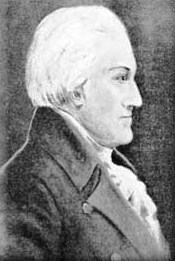 Henry Livingston Jr.
Henry Livingston Jr.


